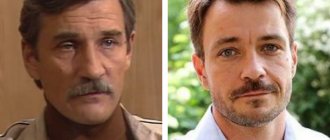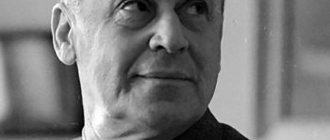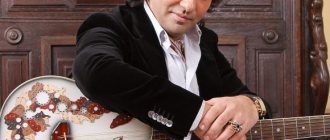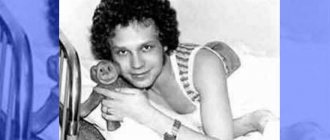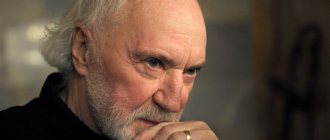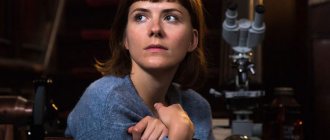Reasonable mathematician
Boris Grebenshchikov himself graduated from school with a mathematical bias, so he easily entered the university. The guy chose the Faculty of Applied Mathematics. Here Grebenshchikov continued to pursue his school hobby - music.
The newly minted student, together with his friend Anatoly Gunitsky, spent their free time in the assembly hall, where they plunged into the creative atmosphere. They wrote poems to which they set music.
The first creations of Grebenshchikov and Gunitsky were written in English and resembled the songs of their idols - Marc Bolan, The Beatles, Bob Dylan.
In the second year of university, Boris, Anatoly and several other talented guys teamed up in the Aquarium group. Rehearsals for the musical project took place in underground apartments in complete secrecy.
Long road to success
The debut album of Grebenshchikov and company was released in 1973 under the title “The Temptation of the Holy Aquarium.” The following year, there were changes in the team; two members were accepted: A. Romanov and M. Weinstein.
Music critics praised the work of young musicians, describing it as: “Attempts to create new conceptual music.”
The talented guys decided to try their hand at acting. So they started staging small plays in the auditorium, which the students surprisingly liked. This hobby turned out to have a downside; the members of the Aquarium group left the project one after another, plunging headlong into the world of reincarnation. Ultimately, Boris was left alone, but was in no hurry to give up.
Gradually, Grebenshchikov recruited a new team, with whom he worked fruitfully for more than 15 years. The first to join him was Vsevolod Gekkel, playing the cello. Boris, meanwhile, was busy writing songs, which later became hits.
In 1976, the Aquarium group presented the album “From the Other Side of the Mirror Glass.” A few years later, Grebenshchikov, together with Mike Naumenko, recorded the album “All Brothers and Sisters.”
Collaboration with Andrei Tropilo’s recording studio gave Aquarium fans new records: “Blue Album”, “Triangle”, “Acoustics”, “Taboo”, “Silver Day”, “Children of December”.
The stunning success brought Grebenshchikov many problems. He was expelled from the Komsomol, fired from his official job, and banned from performing in public, which was the worst thing for a musician.
Unbroken Boris Grebenshchikov continued to confidently move towards his goal. He got a job as a janitor so as not to fall into the number of so-called slackers. Now he secretly performs at apartment parties, where equally talented people, but not liked by the authorities, gather. Here fate brought him together with avant-garde artist S. Kuryokhin, who helped Grebenshchikov get on the television program “Jolly Fellows.”
A bright streak begins in Boris's life; he was accepted into the Leningrad rock club. In 1982, Grebenshchikov acted as producer of the popular Kino project. In 1989, the musician went to the USA, where he recorded two English-language albums.
In America, BG met some famous rock performers. In 1990, an unexpected statement was made by the leader of the Aquarium group about the termination of the project with that name.
Boris Grebenshchikov founded a new creation, the BG Band, which failed miserably a few years later. As a result, “Aquarium” had to be returned, which continued to delight its loyal fans.
In the mid-90s, Boris began to actively perform at large venues, clubs, and stadiums. The musician began recording soundtracks for many domestic films.
In 1994, Boris presented two solo albums: “Soulful Songs” and “Songs of Alexander Vertinsky”. On the eve of the big concert in France, a presentation of the collection “BorisGrebenchikov&Aquarium” took place.
By that time, the talented musician had won many prestigious awards, including the “People of Our City” award, “For contribution to the development of rock music,” and the title of laureate of the Tsarskoye Selo Art Prize.
In 2006, Boris Grebenshchikov plunged headlong into neo-Hinduism , and the famous guru Sri Chenmoy became his mentor. The Hindu gave the Russian musician a new name, Purushottama. Sri helped Boris organize a solo concert in London, which took place at the Royal Albert Hall. The following year, the singer gave a big concert at the UN Assembly.
Periodically, information appeared in newspapers and magazines about the collapse of the legendary Aquarium group. But these were ducks that weren't worth a damn.
The latest changes in the group affected only its name, which changed to “Aquarium International”. Brian Finnigan joined the close-knit group on flute.
Main dates of the biography[ | ]
- 1971 - Boris Grebenshchikov graduated from physics and mathematics school No. 239 in Leningrad.
- Summer 1972 - Grebenshchikov, together with Anatoly Gunitsky, founded the Aquarium group. Until the mid-eighties, the group lived a semi-underground life, making home recordings and occasionally going on short tours to other cities.
- 1977 - Grebenshchikov graduated from the Faculty of Applied Mathematics - Control Processes of Leningrad State University. Zhdanov and began working at the Research Institute of Sociology, continuing to write songs, perform concerts and collaborate with the experimental theater of Eric Goroshevsky.
- 1977 - founded the samizdat music magazine “Roxy”.
- Summer 1978 - joint recording of the acoustic album “All Brothers and Sisters” with Mike Naumenko. Mikhail Fainstein took part in the recording. Grebenshchikov became interested in the work of Bob Dylan.
- Spring 1980 - after performing at the Tbilisi rock festival, which took place in March 1980, he was fired from his job at NIIKSI and expelled from the Komsomol.
- 1981 - the first full-fledged samizdat album in the history of Russian rock, with a cover recorded in the studio - “Blue Album” by “Aquarium”. The group becomes a member of the Leningrad Rock Club; Since 1983, she took part in the first five of its festivals.
- 1982 - producing the first album of the Kino group "".
- 1986 - Aquarium’s last samizdat album “Ten Arrows”.
- 1987 - Aquarium's first record in the USSR
- 1989 - Release of the first English-language album "Radio Silence" abroad, featuring Dave Stewart from Eurythmics.
- 03/14/1991 - termination of the activities of Aquarium.
- 1991-1992 - “BG-Band”. "Russian Album".
- 1992 - Grebenshchikov assembles a new cast of “Aquarium” (“Aquarium 2.0”).
- 1993 - Grebenshchikov is included in the annual “World Music” program by the City Theater of Paris (formerly Sarah Bernhardt Theater) and gives a big concert in November 1994.
Poster for a concert at the Theater de la Ville in Paris, 1994
- 1997 - winner of the Triumph Prize. Dissolution of Aquarium 2.0. Recordings in the USA with The Band. Album "Lilith".
- 2003 - 50th anniversary of Boris Grebenshchikov and a big concert in the Kremlin on this occasion[4][5].
- March 2005 - organized a meeting of a number of rock musicians and producers with Vladislav Surkov, deputy head of the presidential administration, which caused a great resonance in the media[6][7].
- May 22, 2005 - began his career as a radio host and hosts the almost hour-long original program “Aerostat”[8] on Radio Russia.
- In 2006, Grebenshchikov underwent vision correction surgery.
- May 21, 2007 - concert at the Royal Albert Hall.
- On January 8, 2009, heart bypass surgery was performed in Berlin.
- February 2014 - Grebenshchikov’s second concert at Thetare de la Ville, Paris.
- 2014 - new solo album “Salt”, “the best in over 40 years”[9].
- 2017 - Boris Grebenshchikov became artistic director of the annual St. Petersburg festival “Parts of the World”.
Work is fun
Grebenshchikov not only managed to write lyrics for future hits, as well as perform them, but also act in films. Boris made his debut in the short film “Ivanov...”, where he played a key role and portrayed the musician Borya. Then there were episodic roles in such diverse films as: “The City” and “Over Dark Water.”
In 1993, Boris Grebenshchikov received the main role in the romantic comedy “The City”. Here his character's name is Volodya, he is madly in love with a beautiful girl Alevtina.
But an inexperienced guy doesn’t know where to start dating, so he lets everything take its course. As a result, Grebenshchikov's hero becomes successful, but the proud and unapproachable girl masters the profession of a prostitute.
In addition, Boris Borisovich Grebenshchikov has published several books over the years:
- Works in 2 volumes: volume 1 “Songs”, volume 2 “Non-Songs”.
- Book of Songs
- Two verses about apartment number six.
- Balloon. Currents and lands.
- Balloon. Aeronauts and artifacts.
- Balloon. Parallels and Meridians.
- Balloon. Variations on the Theme of Adam and Eve
- Grebenshchikov B.B. Tramontana: Author's collection
- Grebenshchikov B.B. Silver of my Lord
- Grebenshchikov B.B. Songs of BG
In addition to journalism, Boris Grebenshchikov was the author of prose works, namely: the story “The Forest” (“A Novel That Was Never Finished”) and the story “Ivan and Danilo.”
Grebenshchikov's excellent musical taste and his knowledge in the field of music allowed BG to establish himself as a radio host . Since 2005, Boris Borisovich has been hosting an hour-long original program “Aerostat” on Radio Russia.
Favorite women of the musician
Grebenshchikov lived with his first wife Natalya Kozlovskaya for four years. In their marriage, they had a daughter, Alice, who became a sought-after artist. Boris's next relationship was with artist Lyudmila Shulgina. It is worth noting that before BG the girl lived with Vsevolod Gekkel.
Soon Boris Grebenshchikov became a father for the second time, and the boy Gleb was born. In 1991, Grebenshchikov legalized his relationship with Irina Titova , who already had two children of her own: Vasilisa and Mark. Boris adopted Vasilisa in order to become even closer to her and the child’s inner world. Now the girl is still engaged in painting.
Boris Grebenshchikov, children
For Boris Grebenshchikov, personal life was always in second place after his work, but for him, family was a necessity, without which he might not have succeeded as a famous composer and performer. BG was married three times and became a father twice. The children of Boris Grebenshchikov had little contact with their dad, but his name played a role in their lives. His first daughter Alice stayed with her mother when she was two years old. Grebenshchikov lived with his first wife for less than three years - her husband’s bohemian lifestyle did not suit Natalya, and she decided to leave him.
In the photo - Boris Grebenshchikov
Alisa Grebenshchikova inherited from her father a craving for creativity - at school she wrote for the newspaper “Five Corners” and studied at the small journalism department of St. Petersburg State University. But Alice never became a journalist, and after school she entered the Academy of Theater Arts and became an actress. She played on the stage of the Moscow Art Theater and is known to viewers for several roles in films and TV series.
In the photo - Alisa Grebenshchikova
The second of Boris Grebenshchikov’s children, Gleb, was born in the artist’s next marriage with Lyudmila Shurygina. Gleb also became a musician. Grebenshchikov gladly admits that his son followed in his footsteps, but does not say that his son was once abandoned by him. When Gleb was only three years old, Boris left them with his mother for another woman, Irina Titova. Lyudmila could not bear such a betrayal, she began to drink heavily, and her son was left to his own devices. Due to poor performance, he had to change three schools. His father did not remember him at all, his mother was in constant drinking bouts, and Gleb, whom none of his parents cared about, became addicted to drugs and alcohol early on.
In the photo - Gleb Grebenshchikov
But Boris, nevertheless, played a positive role in the fate of his son - when after school he could not enter any university, with the help of BG, Gleb managed to get into the St. Petersburg representative office of the French University College. However, Grebenshchikov’s son was not going to change his lifestyle - he loved to have fun in a noisy company, and for many years he was considered an “eternal” student at the college’s correspondence department. He had a permanent girlfriend, Elya Veretennikova, who gave birth to his daughter Alisa, and later they got married without informing either friends or relatives.
Two more children of Boris Grebenshchikov are the son and daughter of his third wife Irina Titova. Son Mark is also a musician, writes electronic music and plays in several independent bands, and daughter Vasilisa became an artist. Maybe,
